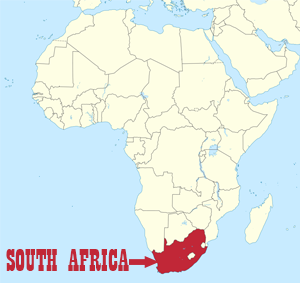 In
South Africa, the
Southern Africa Federation of the Disabled (SAFOD) works with
its national affiliate, the
Disabled People South
Africa (DPSA). DPSA was formed in 1964 and registered as a
non profit organization (NPO) in 2000 under the Department of Social
Development. DPSA was formed with the purpose of unifying the voice of
the disabled people. DPSA works to protect and advance the interest of
all persons with disabilities in the Repubic of South Africa.
In
South Africa, the
Southern Africa Federation of the Disabled (SAFOD) works with
its national affiliate, the
Disabled People South
Africa (DPSA). DPSA was formed in 1964 and registered as a
non profit organization (NPO) in 2000 under the Department of Social
Development. DPSA was formed with the purpose of unifying the voice of
the disabled people. DPSA works to protect and advance the interest of
all persons with disabilities in the Repubic of South Africa.
South Africa ratified the Convention on the Rights of Persons with Disabilities and its Optional Protocol without any reservations in 2007 and it subsequently entered into force on 3 May 2008.
Statistics South Africa reported in 2014 that 7.5% of the country's population constituted people with disability, based on the 2011 census estimates. In its Profile of Persons with Disabilities in South Africa, the statistics body further breaks down the fugures, and the highest proportion by province was found to be in the Free State with 11,1%, followed by the Northern Cape with 11%, the North West with 10%, the Eastern Cape with 9,6%, KwaZulu-Natal with 8,4%, Mpumalanga with 7%, Limpopo with 6%, the Western Cape with 5,4% and Gauteng with 5,3%.
In terms of disability prevalence by sex, it was found that disability was more prevalent among females compared to males (8,3% and 6,5% respectively), while in terms of disability prevalence by sex, the celsus showed that more than half (53,2%) of persons aged 85+ reported having a disability..

With regards to the assistive technology, the Research Brief on Disability and Equality in South Africa published in 2017 by South African Human Rights Commission (SAHRC) noted that, on one hand, in the public sphere, the Department of Public Works (DPW) is the custodian of public buildings and is responsible for making those buildings accessible in order to prevent indirect unfair discrimination from occurring. Whereas, on the other hand, the Department of Public Service and Administration (DPSA) has developed a regulatory framework that aims to foster consistency across the public sector in respect of the provisions of assistive devices, personal assistance and technology for public servants with disabilities. The resultant Policy on Reasonable Accommodation and Assistive Devices in the Public Service came into effect in April 2016.
Through the AT-Info-Map project, SAFOD and its partners have found that one of the main challenges facing Southern Africa is the lack of assistive technology manufacturing. SAFO further found that besides importing assistive technology from overseas like China, Europe, etc., the majority of the assistive technology in Southern Africa were imported from South Africa though South Africa-based suppliers. However, this does not necessarily mean that the level of access by persons with disability in South Africa to affordable and appropriate assistive technology products was good compared with other countries in the same region.
The Department of Social Development (DSD) in South Africa offers qualifying residents income support in the form of disability grants. But the 2014 study by the Centre for Social Development in Africa (CSDA) at the University of Johannesburg showed that the grant was only received by 10% of the disabled people in South Africa, meaning a significant number of people with disability needing assistive technology support might not be able to access affordable and quality assistive technology due to financial constraints.
The White Paper on the Rights of Persons with Disabilities, approved by South Africa Cabinet on 9 December 2015, identifies/recommends Assistive device and technology support services as one of the measures that must be implemented in order to guarantee persons with disabilities access a range of disability specific services to attain and maintain maximum independence, full physical, mental, social and vocational ability, and therefore full inclusion and participation in all aspects of life.
SAFOD will continue to update this page with any new interesting information related to the AT situation in the country, or if you are a disability focused organization that has worked in South Africa, or an independent researcher with any useful information about the AT situation the country, SAFOD would love to hear from you should you be willing to share whatever related information you may happen to possess. Please contact us here